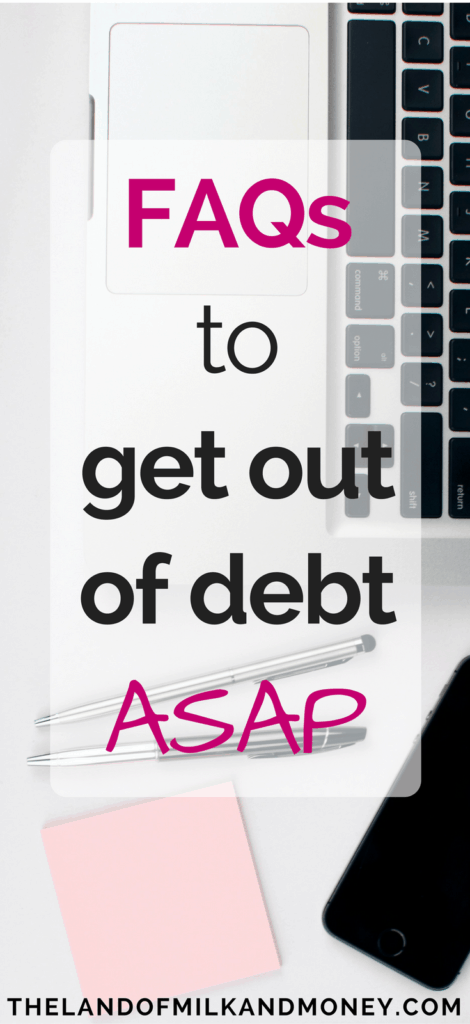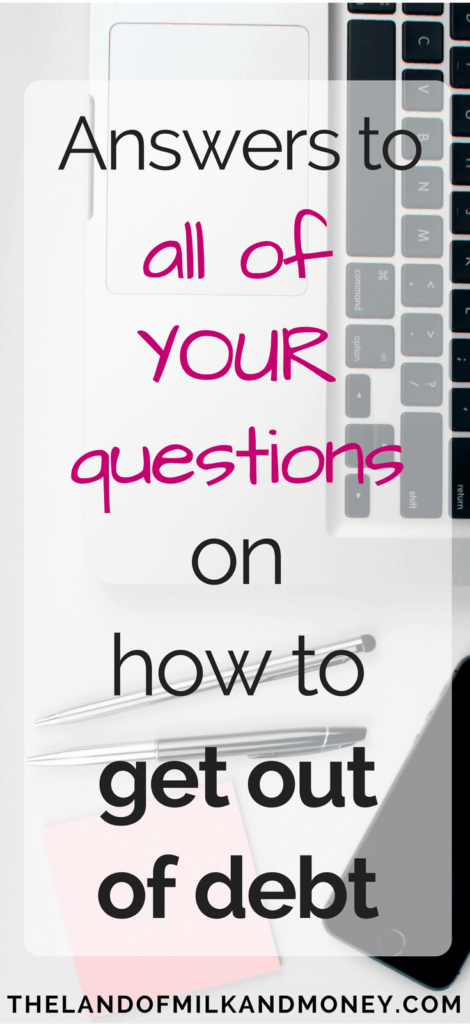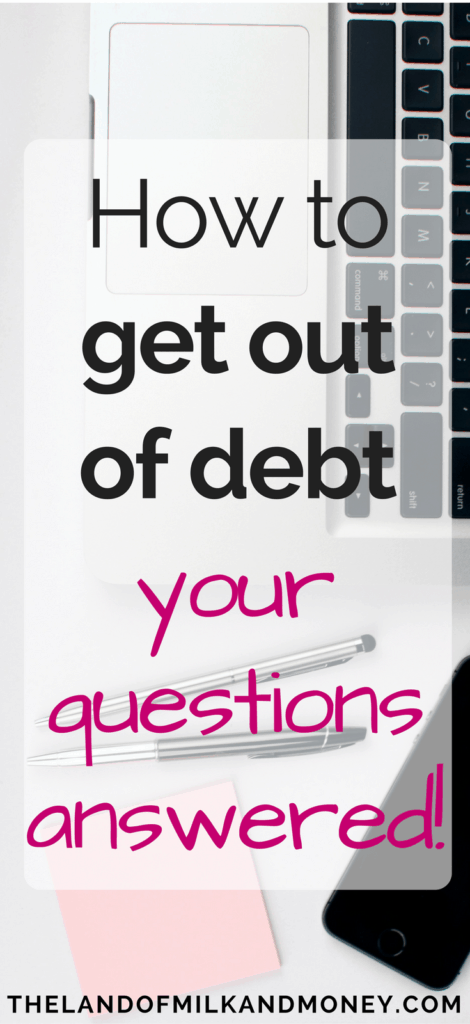So you’ve read The Definitive Guide to Getting Out of Debt. You’re ready to pay off your debt and start on the path to financial freedom.
But…you just want to clarify a few things.
Maybe you’ve heard of some other ways to pay off debt that weren’t mentioned there.
Perhaps your colleague told you about this great way to delay your credit card repayments or your neighbour mentioned a flyer they received in the mail with an interesting offer.
You’ve done the right thing by seeking more information. When it comes to your finances, you should be as informed as possible before making any major decision.
So check out the Frequently Asked Questions below!
(And if you have a question not mentioned here, feel free to add it in the comments!)
Check out these related articles:
- The Definitive Guide to Getting Out of Debt
- How to Refinance Your Student Loans in Minutes and Save Thousands
- How to Think Like a Future Millionaire
- The Only Tip You Need to Reach Financial Freedom As Soon As Possible
- The One Principle That Will Guarantee Your Financial Future

I have so much debt! What do I do?!
Before really diving into how to address this, I want to congratulate you!
You wouldn’t be on this page unless you wanted to do something about your situation. Many people are not yet in your position and absolutely should be. So the fact that you’ve accepted that there’s a problem to be fixed is a fantastic first step.
Next, if you haven’t done so already, read this article. If you have read it, revisit it.
It sets out exactly how to pay off all of your debt, no matter how much that may be.
To quote that article:
“It’s very straightforward to do. Not easy and not necessarily fun. But extremely simple.”
And another:
“As mentioned, it’s not going to be easy. But when you’re free from the shackles of your debt, you’ll only wish you’d started earlier.”
You seem ready for that due to the fact that you’re here. So look yourself in the mirror, give yourself a stern talking-to, and get started with implementing the action plan in The Definitive Guide to Getting Out of Debt.
I have a mortgage for my home which is ‘good debt’, right? Does this mean that I shouldn’t pay it off using that strategy?
Firstly, I don’t entirely agree that a mortgage is ‘good debt’.
(This is coming from someone who rents, by the way. I’ll cover this in more depth another time but, essentially, renting rather than owning my own house is a much better financial decision for me in light of my current personal circumstances.)
Interest rates at the moment are at historic lows, allowing people to borrow more than they could in previous years.
In addition, banks apparently didn’t learn from the economic catastrophe of 2008 and are lending more and more. Again, this allows people to borrow more for their houses than they previously could.
This means that many people have mortgages for far more than they should. They see the massive figures being presented by mortgage brokers and are dazzled by houses that are far more than they need. Scarily, these will also be far more than they can afford when interest rates inevitably rise.
I’ll go into more detail another time about why a mortgage is not a good debt – and why it may be a better financial decision for you to rent rather than buy – but, broadly speaking, you should keep the following in mind when taking out a mortgage:
- You more than likely don’t need as much as they’re offering you. Only borrow what you absolutely need and not a cent more.
- Remember that the bigger the mortgage, the more expenses you’ll have. I don’t only mean interest repayments, although they are the height of financial pain. But if you get a bigger mortgage and, consequently, a bigger house, you’ll have bigger expenses. Utilities (more space to heat/cool), higher land taxes, furniture (you have to fill all of those extra rooms), more maintenance etc.
- You can never be financially free until you have no debt. As such, the bigger the mortgage, the longer it will take you to pay off and thus the longer it will take you to reach financial freedom. Are those extra square feet worth working for an extra decade?
If you already have a mortgage that you’re looking to pay off, first consider if there’s any possibility of selling your house and downsizing to a different one. Bonus points as well if it involves you moving closer to work and reducing your commute to a distance that allows you to bike ride or take public transport.
Otherwise, the strategy set out in this article for paying off debt applies to all debts, including your mortgage.
Remember: you’ll never be financially free while you have debt.
This includes a mortgage.
However, there is one caveat to this that I’ll discuss in the next section.
Should I really be paying off debt that has a low interest rate?
Just to metaphorically bash you over the head with this again:
You’ll never be financially free while you have debt.
But.
It’s true that your investments should be earning at least 7% per year on average, if not more. So there’s a valid argument that your money could, in some cases, be better utilised in your portfolio rather than used to pay off debt.
After all, if your investments are earning 7% and your interest rate is 4%, you’re better off by 3%.
That said, there are some risks with this strategy, the biggest one being that interest rates on your debt could rise. In addition (knock on wood), something could happen to your income stream, such as you getting fired or getting sick and no longer being able to work, which means that you may suddenly not be able to make your minimum debt repayments. You would then have to dip into your savings, which can have tax implications that may end up costing you more.
It’s also generally better to be debt-free, something which you should be aiming to achieve as quickly as possible.
So the general rule is as follows:
If the interest rate on your debt is less than 3%, only pay the minimum repayments.
If the interest rate on your debt is between 3% and 5%, consider your options. It may be worthwhile to only pay the minimum repayments depending on how the rest of your money is being utilised. This should, however, be weighed up against the (many!) advantages of becoming debt-free.
If the interest rate on your debt is more than 5%, time to get rid of it by doing as much as you can to pay it off.
I have massive amounts of student debt. What can I do?
You go and read How to Refinance Your Student Loans in Minutes and Save Thousands.
It sets out:
- A summary of some of the major players in student loan refinancing, including their pros and cons;
- The key factors that lenders will consider when determining whether to approve your application;
- Details on the application process;
- When refinancing your student loans may be a good idea for you; and
- (IMPORTANT) When refinancing may not be the best option in light of your circumstances.
There is even one specific option that saves people an average of $18,668 when refinancing their student loans, so you definitely want to go and have a look at that to see if it may be an option for you.
Should I look into debt consolidation?
Ahh, the most annoying answer of all: maybe.
Firstly, it depends on what you mean by this.
You may, for example, have a credit card debt with a very high interest rate. In addition, you may have not reached your maximum limit on one of your debts with a lower interest rate. As such, you could consider using the lending option with the lower rate to pay off some or all of the debt with the higher interest rate.
This could allow you to then continue to repay the debt, but at a lower interest rate, thus costing you less and taking less time to pay off.
However, don’t focus all off your energy on this as a potential strategy. Some people spend time trying to bounce their debt around just to save a few fractions of a percent.
The more important factor in debt repayment is cutting your unnecessary expenses and putting all of your energy into getting rid of each debt.
Another option is to take out a debt consolidation loan.
This involves taking out a loan to pay off all (or a large chunk) of your debt, meaning that you then only have to make repayments on this new loan.
Lending Club is a great option for this. They’re renowned for offering good deals on debt consolidation in light of your personal circumstances. There are also plenty of highly positive reviews all over the internet, particularly regarding the great interest rates that are on offer through them. As some specific points in their favour, people say that the paperwork is not overly cumbersome and that the loan doesn’t appear as a “credit card” on your credit report.
As always though, do your research to check that it’s right for you in light of your personal circumstances. Read the fine print meticulously and double check the specific conditions that apply to the loan for which you’re applying.
For example, while this may be an obvious point, if the interest rate on the loan is higher than the debts you are considering consolidating, it’s not worth it.
It’s for this reason that debt consolidation tends to work best with credit card debts, as they’re more likely to have much higher interest rates.
Also, even if the interest rate on the loan will be less than some/all of your existing debt, check that the fees on the loan are low enough to make it worthwhile.
Make sure as well that the interest rate throughout the entire life of the loan will make it worthwhile. This is especially the case if you have a lower rate throughout an introductory period.
Finally, see the point above about where you should be focussing your energy during the debt repayment process.
After all this, you may have decided that debt consolidation is worth it for you from a financial perspective. If so, see above.
And remember: don’t treat a debt consolidation loan as a get out of jail free card. You still have the debt and you still have to pay it off.
You may get yourself some breathing room regarding the interest rate, but this should just mean that you use the opportunity to pay off even more of the principal. This, in turn, will allow you to pay your debts off faster and pay less interest overall.
Should I do a balance transfer?
A balance transfer involves moving the balance on your high interest credit card to a new credit card with a lower interest rate.
It’s certainly a viable option if your debt is under the relevant limit (usually about $15,000).
However, as above, this should be considered as a way to get some breathing space, not a way to avoid paying off your debt.
Some people jump from card to card to try to reduce the interest they have to pay. While this may seem like a great idea to pay less, their focus is on the wrong issue. Instead, the problem could be avoided by growing up, knuckling down and working hard to pay it off, rather than wasting time trying to delay the inevitable.
(It also could end up costing you more as some cards will charge you the normal interest rate retroactively if you transfer your balance within the introductory period)
That said, when looking into this as a short-term reprieve, make sure you ask a few questions.
In particular, consider the balance transfer fee, the interest rate (including any reduced rate during an introductory period – which is often 0%), the length of the introductory period and the annual fee on the card.
You should ask yourself whether the amount you will be saving through the reduced interest rate is less than the balance transfer fee, as well as whether you will be able to pay off most of – if not all of – the balance of the debt during the promotional period.
If the answer to both is yes then a balance transfer card may be an option for you.
Once you have it, do as much as you can to take advantage of the reduced interest rate during the introductory period, especially if you sign up for one of the 0% balance transfer cards.
You’ll be saving yourself a ton of interest, as all of your payments will be going towards the principal. This could save you months of repayments.
Just always be aware of the fine print, consider your personal circumstances and whatever you do, don’t use this as an opportunity to incur more debt.
Remember: You’ll never be financially free while you have debt.
So it’s time to face your debt head on.
It will be simple – but not easy.
Except that it will easily be the best decision that you’ll take all year.
Let me know in the comments if you have any other questions about paying off your debt and let’s see if we can get you on the path to being debt-free today!


